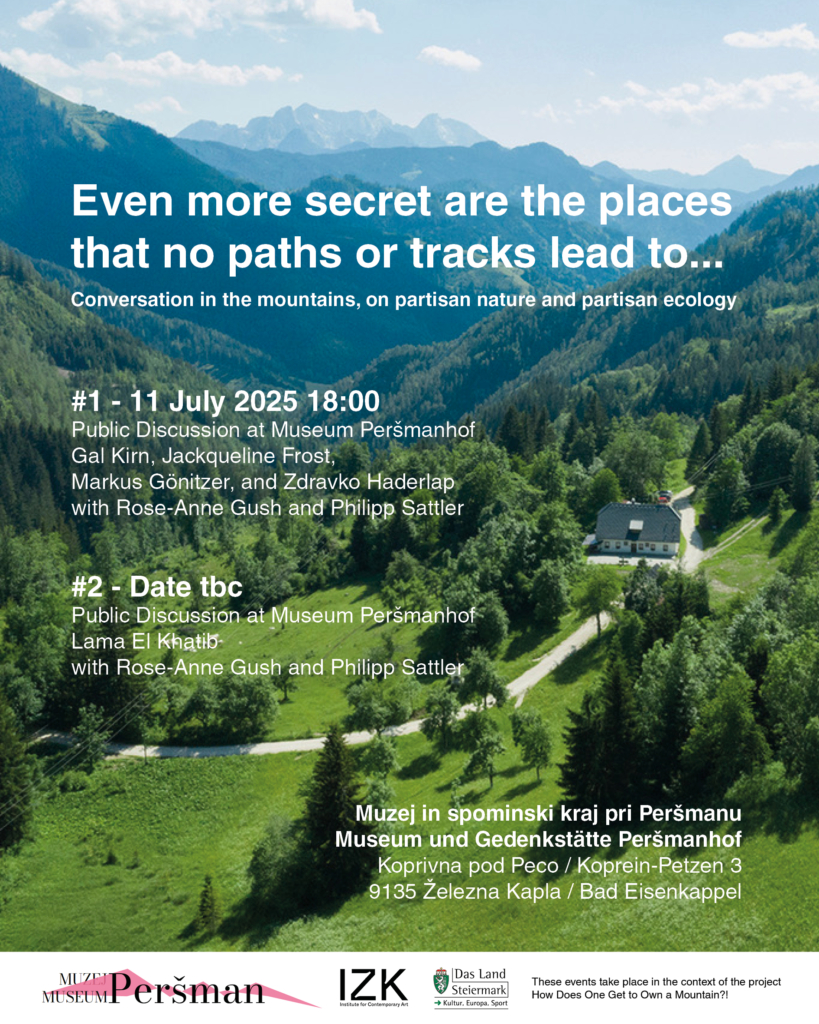a conversation in the mountains, on partisan nature and partisan ecology

#1 - 11.7.2025 18:00
public discussion at Museum Peršmanhof
Gal Kirn, Jackqueline Frost, Markus Gönitzer, and Zdravko Haderlap
with Rose-Anne Gush and Philipp Sattler
#2 - date tbc
public discussion at Museum Peršmanhof
Lama El Khatib
with Rose-Anne Gush and Philipp Sattler
Gal Kirn is a research associate at the Chair of Cultural Philosophy/Philosophy of Cultures at the European University Viadrina. He primarily works in the fields of cultural sociology, critical memory studies, and theories of decolonial, ecological, and social transformation. One of his main research areas is Southeast Europe, which he attempts to place within broader postsocialist and decolonial currents. Most recently, Gal Kirn led the research group "Protests, Art Practices, and Memory Culture in the Post-Yugoslav Context" (University of Ljubljana, 2021–2025). His publications include Partisan Ruptures (Pluto Press, 2019), Partisan Counter-Archive (De Gruyter, 2020), and Nights of the Dispossessed: Riots Unbound (edited with Natasha Ginwala and Niloufar Tajeri, Columbia Press, 2021). His new book The Memory of Liberation: Studies on the People’s Liberation Struggle in the (Post-) Yugoslav Context (Ljubljana University Press, 2025) is recently published.
Jackqueline Frost is an intellectual historian of transatlantic political culture. Her articles have appeared in The Global South, The Bulletin of Francophone Postcolonial Studies, Historical Materialism and Third Text. Jackqueline’s doctoral work traces the philosophies of historical time produced by militant writers in the midst of mid-century antiracist movements in France and the Caribbean. With Jorge Lefevre Tavárez, she works on the reception of francophone and anglophone anticolonial theory in revolutionary Cuba. Jackqueline lives in Paris, where she is a member of the Aimé Césaire research group at the Institut de textes et manuscrits modernes (CNRS/ENS).
Markus Gönitzer is a cultural worker and curator of discourse. Since 2021 he has been a member of the management collective and artistic directorate of Forum Stadtpark in Graz, chairman of Verein/Društvo Peršman, and part of the project coordination of the initiative WerkStattMuseum at the Margarete Schütte-Lihotzky Haus in Klagenfurt/Celovec. His principal fields of work comprise culture(s) of remembrance, theories of utopia and transformation, as well as art and cultural initiatives as vehicles of social change.
Lama El Khatib is a writer and cultural worker researching histories of labour, conditions of debt and inheritance, and abolitionist practices. She has been trained in architecture and studied art history and philosophy at the American University of Beirut, and she currently pursues an MA in philosophy at the Freie Universität Berlin. Since 2018, she has worked in the context of the Whole Life Academy - an experimental collaborative initiative invested in developing archival research methodologies in relation to contemporary socio-political urgencies - at the Haus der Kulturen der Welt in Berlin. Through drawing, writing, and object-making, her practice examines topological and spatial relations as aesthetic, political, and cultural questions, taking up the architectural as both a field and medium for radical social thought. In 2025 she co-organises the project Unsettled Earth.
Philipp Sattler is a researcher, artist, educator and writer with a background in Architecture, Economics, as well as English and American Studies. He is a PhD student at the Royal College of Art (RCA), School of Architecture, London, and Assistant Professor at IZK – Institute for Contemporary Art, at TU Graz. His transdisciplinary work concerns the material and conceptual conditions, spatial manifestations and ecological devastations of agriculture, mining, building and property between the rural and the urban. His work currently is focusing on past and present histories of fascism in Austria. He is a founding member of Sans Souci Collective and Das Gesellschaftliche Ding, who operated and curated the former exhibiting space Annenstrasse 53, in Graz, Austria. He collaborates within the project, How Does One Get to Own a Mountain, with Rose-Anne Gush.
Rose-Anne Gush is a writer, art historian and assistant professor at the IZK — Institute for Contemporary Art at TU Graz. Her research interests include political aesthetics and theories of ‘global art’, including transnational surrealism, the spatial politics of capitalism, artistic form and geographies of extraction, as well as theories of Marxism, gender, trauma and memory. Her recent articles have been published in Berlin Review, FKW // Zeitschrift für Geschlechterforschung und visuelle Kultur, Camera Austria, Brand-New-Life Magazine, Third Text, Kunst und Politik: Jahrbuch der Guernica-Gesellschaft, and Performance Research. Her first monograph Artistic Labor of the Body is forthcoming in the Historical Materialism book series published by Brill and Haymarket. With Philipp Sattler, she collaborates on How Does One Get to Own a Mountain?! which uses artisic research to explore lithium extraction in Austria and its planetary imbrications.
These events take place within the project, How Does One Get to Own a Mountain?!, and are supported by TU Graz, Land Steiermark and Museum Peršmanhof.